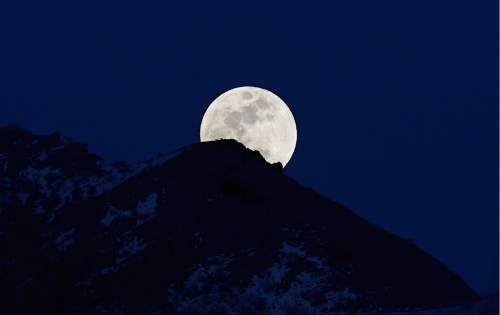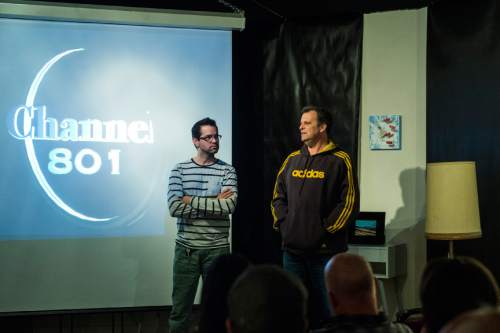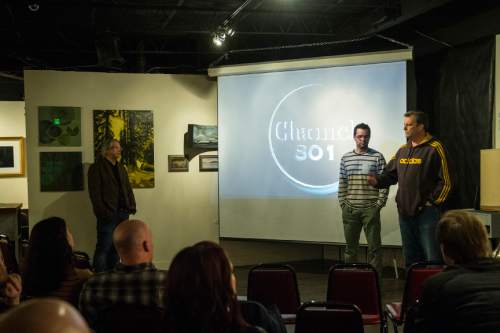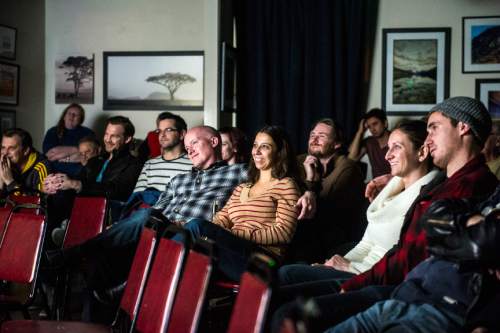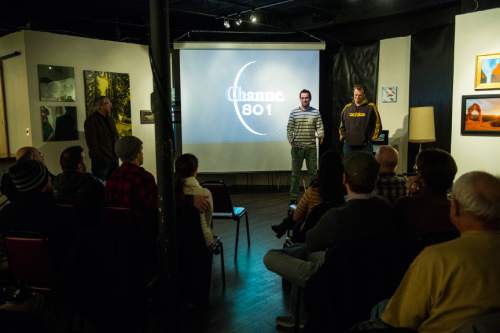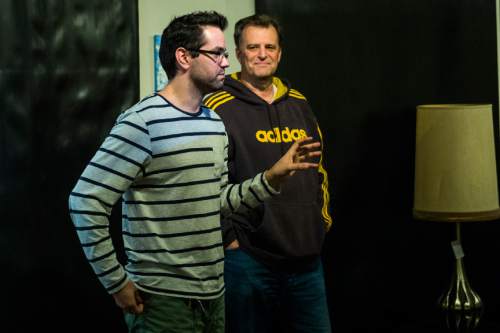This is an archived article that was published on sltrib.com in 2016, and information in the article may be outdated. It is provided only for personal research purposes and may not be reprinted.
Tad Henderson and his family were driving home on a crisp January night last year, with a brilliant full moon bathing their journey in light.
That's when his daughter asked, "Isn't it dumb that the moon's name is moon?"
At least, that's been its name for centuries, after it was "mona" in Old English and "luna" in Latin. But while astronomers have given the other 170-some moons in the solar system names like Titan and Ariel, Earth's pale companion has been left with only its classification ("a moon") as its name ("the moon"). It's sort of like if a cat was named Cat.
Henderson agreed with his daughter: "Let's name it something different."
Now he's helping lead an online campaign to do just that. Last month, Henderson helped start the Utah-based "Name the Moon" campaign to gather signatures and petition the International Astronomical Union to give the moon a better name.
The union has been charged with naming celestial objects for about a century, but astronomers have been naming moons since 1610, when Galileo squinted into his telescope and discovered the first moons besides Earth's. Most of the solar system's moons share monikers with Greek mythological characters, like Rhea, the mother of the gods; Prometheus, the titan who gave fire to humans; and Kale, a daughter of Zeus, not the trendy vegetable. (In fact, almost all of Jupiter's 50 moons are named after a lover or daughter of Zeus.)
But our moon remains, simply, "the moon."
Last week, in the downtown Salt Lake City art gallery Mod a-go-go, Scott Halford pitched a packed room on the campaign. With its flashy 1960s-era decor, the gallery felt right; the attendees were surrounded by the same furniture people sat on — likely, the edges of — as they watched mankind first step foot on the moon.
But Halford, an animator, brought more than a bold proposition. Thanks to the Channel 801 film showcase that night, Halford screened the first few episodes of an animated Web series he's been producing with his family: "Looney Moonies."
On a projector screen, anthropomorphous moons kicked around a soccer ball until a shy, gray newcomer tried to join. When they asked the stranger what its name is, they're shocked to find the moon doesn't have one. Soon, they're giving the moon makeovers, trying out new names and identities: Genghis (as in Khan), Marilyn (as in Monroe) or Poe (as in Dameron from "Star Wars: The Force Awakens").
Besides promoting the campaign, Halford said he hopes "Looney Moonies" spins into an astronomy-focused educational show.
The series, hosted on YouTube, has been a labor of love. Halford took four weeks of unpaid leave from his job to pour 12 to 15 hours per day into animating the episodes. The show has a "Peanuts" feel, with the characters' bulbous heads and voices supplied by child actors: The moon, for instance, is Halford's 4-year-old daughter. Phobos, who has a lot of phobias (it's named after the personification of fear in Greek mythology), is voiced by Henderson's grandson.
"We're really trying to reach people's imaginations and connect with people, especially kids," said Henderson, who accompanied Halford to the screening. "I know [naming the moon is] kind of a silly idea, we knew that from the outset, but we thought if we brought characters to it and really helped bring more imagination to it … that it would last longer and maybe be more meaningful and lead to something that we could do in the future."
NASA seems to be on the campaign's side. On its website, it has an educational page that explains how many moons orbit the planets in our solar system. When the lesson gets to Mars and mentions that the red planet's two moons are called Phobos and Deimos, NASA asks: "Don't you wish our moon had a cool name like that?"
Through the campaign, which encourages people to submit their name ideas, Henderson has heard suggestions like Hope, Pax (Latin for "peace") and Lani (Hawaiian for "heaven"). Halford likes "Kai," a word that means "ocean" in Hawaiian and Japanese, because the moon is responsible for Earth's tides.
But the decision is ultimately up to the International Astronomical Union (IAU), which wants to see a large community consensus, according to its charter. Henderson said he's received pushback from some astronomers associated with the IAU.
"It's actually kind of funny. We're really scratching something that they believe we shouldn't be," Henderson said. "But you know, the moon is ours, it's not theirs."
Added Halford: "The moon is part of the universe, and the universe is the common heritage of mankind. So we can name it whatever we want, if we want."
The campaign will submit its petition to the IAU on June 20. As of Tuesday, organizers had collected more than 2,600 signatures.
Twitter: @MikeyPanda


